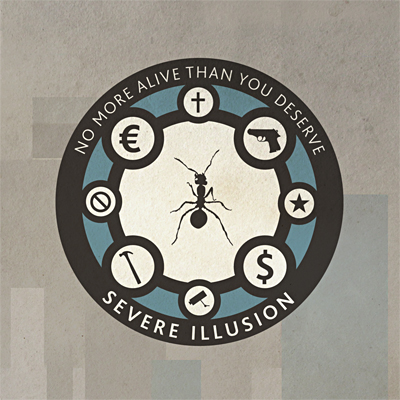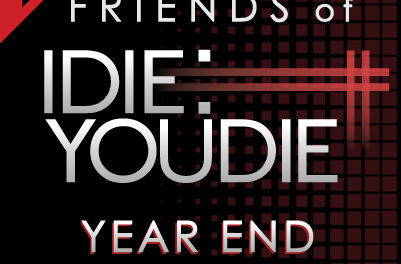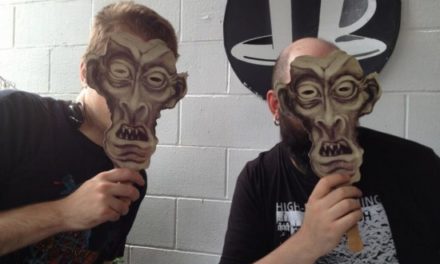We pretty much said it all with yesterday’s intro to our Top 25 Records of 2011 list (which you should go read right now if you haven’t already!) so we’ll get right down to business today. Enjoy, and don’t forget to leave your thoughts on what the best albums of the year were in the comments!
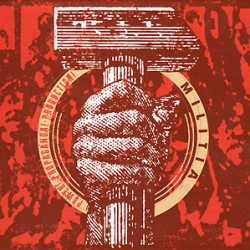
15. Militia
Power! Propaganda! Production!
[Neuropa]
Belgium’s Militia (the band, not whatever Flemish nationalists like to go play soldier in the Ardennes) have always avoided the two major pitfalls of martial industrial – being quasi-fascist pricks and falling into monotonous drum-and-horn wank – by being anarchists and exceptionally creative, respectively. P!P!P! is their strongest record yet, a beautiful tour-de-force which blends industrial’s roots in musique concrète with minimalism (elements of both Glass and Reich are present) while never straying too far from their critique of capitalism or their own origins in pure industrial percussion. While all of this sounds far too weighty to avoid imploding under its own portent (Belgians bang sheet metal while exploring phasing and Kropotkin), P!P!P! is remarkably easy for anyone with an ear for industrial or experimental music on the whole to slip into. Feeling far shorter than its 66 minutes, Militia’s fifth album moves between ambient spaces and clattering percussion, between barks and whispers, all without resorting to noise for noise’s sake or indulgent drones, and never sacrificing music for message or vice versa. If you’ve never checked out one of industrial’s best kept secrets, there’s never been a better opportunity. Read our full review.
“A Kite Of Glass In A Blood Red Sky”
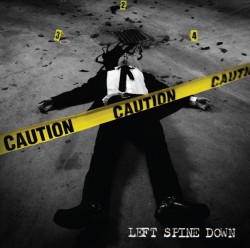
14. Left Spine Down
Caution
[Metropolis]
Vancouver’s Left Spine Down have never lacked for energy or motivation but it wasn’t until this year’s Caution that the band’s large scale ambitions finally came into razor sharp focus. There’s no doubt (even by the band’s own admission) that working with a mega-experienced producer like Dave Ogilvie helped the group evolve their well-established electronic-punk attack, but without melodies as strong as the ones on driving lead single “X-Ray” and the *gasp* quasi-ballad “On the Other Side”, all the sonic sheen that Rave brought to the table might have gone for naught. It’s that marriage of LSD’s rapidly expanding capacity for dynamic songwriting to slick studio wizardry that exemplifies Caution, resulting in an honest to god rock record, a rare beast in these woods to be sure. Less a quantum leap than a bold step forward, the catholic range of influences that have always informed Left Spine Down, from drum n’ bass to hardcore, fit together differently than they ever have before; reliable tools put in the service of new ideas with surprising results. Getting to hear these songs live on their recent jaunt with ohGr brought it home for us: Left Spine Down are playing a new game, and we’re happy to be in the stands for it.
“From Thirty to Zero”
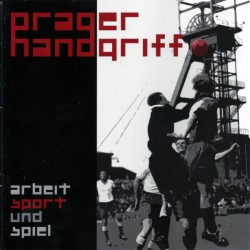
13. Prager Handgriff
Arbeit Sport und Spiel
[Electric Tremor Dessau]
In a year that saw the release of a surprising number of strong roots EBM albums, Prager Handgriff’s Arbeit Sport und Spiel is anomalous; a record with a full-bodied and anthemic quality that uses genre signifiers as starting points rather than ends unto themselves. The burly basslines and pounding drums that are the trademark of the acts on their label Electric Tremor Dessau are certainly in no short supply here, but never before have they contrasted with such a range of emotion, a tacit admission that man can’t live by muscle and hate alone. Drenched in a teutonic stoicism which often yields to a remarkable amount of vulnerability (audible even to non-German speakers such as ourselves), vocalist Stefan Schäfer’s rich baritone is as powerful a weapon as any singer could hope for, deployed to maximum effect on soaring tracks like “Im Westen Nichts Neues” and “Die Dunkle Ewigkeit”. Created with an eye for craft befitting an album named for the simplest of life’s aspects (“work” and “play”), ASuS is a product of experience, informed by Prager Handgriff’s more than 20 years in the trenches and attested to with each resounding fanfare. Grandiose but unprententious, it’s nigh-unprecedented in Electronic Body Music, and an indicator of the genre’s greater unrealized potential.
“Im Westen Nichts Neues”
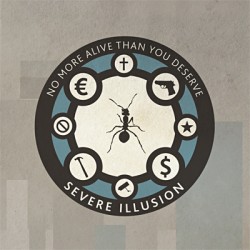
12. Severe Illusion
No More Alive Than You Deserve
[Complete Control Productions]
Sweden’s Severe Illusion don’t have that high of a profile in North America (truth be told we’d never heard of them when No More Alive arrived in our mailbox), and while we certainly hope No More Alive Than You Deserve changes that, it won’t do so by pandering to dancefloor trends or catchy melodies. Like label-mates The Pain Machinery, Severe Illusion trade in an uncompromisingly brutal and steady blend of EBM, but No More Alive‘s ethos is distinctly cold and grinding. Icy Belgian pioneers like Vomito Negro and Klinik are appropriate touchstones, though Severe Illusion’s material stands on its own strengths and then some. Tracks scrape and crawl through the ears with unsettling calm and assuredness. While most definitely violent, No More Alive doesn’t need to wear a gasmask or smear itself with gore to get the job done: the rusty crowbar it’s slowly walking towards you with will do just fine. Rife with a cynical misanthropy which would make H.L. Mencken shudder, No More Alive was one of the bleakest records to pass our way this year, and we couldn’t have been more happy to have made its acerbic acquaintance. Read our full review.
“Mockingbird”

11. Kirlian Camera
Nightglory
[Out Of Line]
We’re obviously a tad biased, but we don’t think our rabid Kirlian Camera fandom is unfounded (the uninitiated can get a taste of KC’s sounds and ID:UD’s worship thereof from our mixtape introduction to the band). After exploring all manner of musical territory (industrial, coldwave, neo-folk) through the 80s and 90s, the band, now with the solidified core of Angelo Bergamini and Elena Fossi, spent the previous decade honing their unique brand of darkwave with a string of incredibly gorgeous records. While soaring lead single “Nightglory” suggested that the album of the same name would continue in that vein, Nightglory delivered just as many throwbacks to the stately neofolk and choral-influenced work they did in the 90s as it did full-on rushes of shimmering ecstasy, all flecked with Angelo’s distinct taste for the uncanny. We would’ve loved to have heard some of these songs stretched out somewhat (“Nightglory”, “Save Me Lord”, and even the orchestral fanfare of “Black Tiger Rising”), but a short running time almost adds to the heartsick swoons Kirlian records prompt. As always, Kirlian Camera remain a bastion of beauty, standing in open defiance of an ugly world. Read our full review.
“Winged Child”
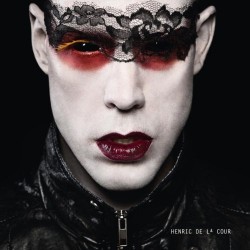
10.Henric de la Cour
Henric de la Cour
[Progress Productions]
The baggage that comes with a solo debut is considerable. Many’s the singer that when freed from the constraints of working in a band has forfeited perspective, losing their way without the creative checks and balances that come from creative partnerships. If former Yvonne and Strip Music singer Henric de la Cour was ever a victim of his own whimsy during the creation of his first album under his own name it doesn’t show, even for a moment. Self-assured and self-possessed (and even self-titled!), the album revolves around De la Cour’s considerable star quality which makes the fact that his personality never outshines the songs themselves that much more admirable. A listen to song-of-the-year contender “Dracula” might suggest an album of new school Depeche Mode worship with hints of The Knife, but the track actually works best in contrast to the post-punk tinged excursions into synthpop and new wave that make up most of the record. That contrast also serves to point out the LP’s greatest strength: its willingness to let the songs themselves be the star as much as the titular artist. There’s a classic kind of pop alchemy here; musicality and performer bolstering one another, neither one more immediately important to the album’s success. And succeed it does. It’s a dazzling turn from a singular voice deserving of wider attention. Read our full review.
“Dogs”
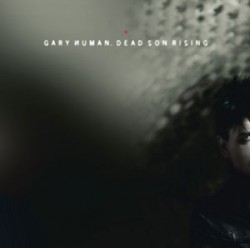
9. Gary Numan
Dead Son Rising
[Mortal]
We’re a bit too close to Gary Numan’s catalog and far too protective of it in the wake of the critical drubbing it’s subjected to whenever some hack wants to make a “lol, synthpop, 80s, goofy hair, amirite” joke to rationally interpret the praise which Numan’s latest seems to be earning. That said, now’s as good a time as any for wiseacres outside of Our Thing to fess up and cop to the class, talent, and straight up fuckin’ genius of ID:UD’s patron saint. After getting over the initial shock of its heavy NINisms, Numan aficionados and passers-by alike should find Dead Son Rising to be a wonderfully full-bodied and evocative listen. In addition to holding one of the year’s best singles in “The Fall”, Dead Son also offered some of its most plaintive and aggressive moments. If there’s been one thing lacking in Numan’s work since his creative rebirth, it’s been a sense of equilibrium between his moods, themes and sounds. With Dead Son Rising, he’s found that balance. There’s nothing holding him back now, and the results are amazing. Read our full review.
“When The Sky Bleeds, He Will Come”
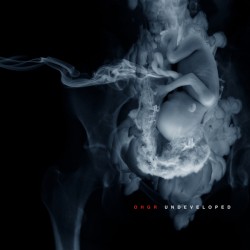
8. ohGr
unDeveloped
[Metropolis]
Previous to the formation of ohGr as a project, anger was always an integral and definitive element of Ogre’s delivery (if we have to tell you in which band, you’re in the wrong part of town, stranger). And while it hasn’t been entirely missing from the first three albums made in collaboration with programmer and producer Mark Walk, it wasn’t until the release of Undeveloped earlier this year that it re-emerged as such a driving creative force. Far from the wall-to-wall screamfest that might imply, though, it’s an LP that succeeds (and mightily so) by exploring the myriad forms that rage can take and following them through to their conclusions. From the acrimonious “Who do I have to fuck?/I don’t know!” chorus on first proper song “101” through to the resentful and defeated penultimate track “Nitwitz”, Ogre channels his distemper to visceral effect. It’s not just that emotional payload that makes Undeveloped so good, though. Contrary to its name it swings back from the more free-form experimentation of preceding album Devils in my Details, producing the strongest collection of hybridized electronic-rock songs since the project’s debut. There’s an unmatched vitality this time around, the darkness of the album illuminated by the vibrancy of feeling and conviction coming out of the artist at its center. Between this album and Skinny Puppy’s arresting return to form Handover, it’s been a good year for Mr. Ogilvie, an unneeded but still welcome reminder of his status as Our Thing’s foremost frontman.
“101”

7. Rome
Die Æsthetik der Herrschaftsfreiheit
[Trisol]
It sounded ridiculous on the face of it: a triple album, penned in the space of a year, no less. Even taking Jerome Reuter’s frenetic output into account, there was no way that Die Æsthetik der Herrschaftsfreiheit wouldn’t suffer from some bloat. While Rome have quickly and understandably earned a substantial cult following, there was still plenty of speculation that the gravity and wit which marks their work couldn’t be stretched across three discs. Undeterred, Reuter doubled-down, cast his net across the breadth of neo-folk and all of the related genres his work touches upon, and managed to emerge a stronger songwriter for his Herculean efforts, with an incredible bounty of recorded works as his reward. We won’t try to plump the depths of Die Æsthetik‘s political and aesthetic philosophy here; we already made a flailing attempt at that in our review. We’ll simply say that it would be one of 2011’s more notable achievements by virtue of its conceit even had it fallen flat as a record. It didn’t. Instead, it’s one of the best listens of the year, and one to which we’ll be returning in the year ahead for further exploration and inspiration. Read our full review.
“Seeds Of Liberation”
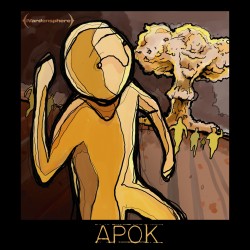
6. iVardensphere
APOK
[Metropolis]
Three albums in three years is a tall order. Three albums that show as much progress as iVardensphere’s have in that space of time is almost unheard of. APOK stands as the exact moment that all the elements Scott Fox has been developing since his project’s inception – tribal percussion, heady sound design, and growling analogue bass – fully coalesced into something altogether new and utterly different from anything else in the industrial gene pool. That achievement alone would have been enough to rank it highly amongst our favourite albums of the year, but it’s in Fox’s further mining of genres outside the immediate confines of what he’s done previously with iVardensphere that the album truly shines. Obvious skill and motivation aside, it’s hard to imagine from a listen to 2009’s Scatterface that only two years later we’d be hearing tracks with the orchestral portent of “Sutekh”, or the smoothly designed, warm trip-hop of “Chasing the Dragon”. Although rife with collaborations, both with new band members and external artists and including the project’s first (and quite accomplished) run at including vocals, APOK doesn’t dilute the identity of the project, but instead reinforces it. It’s thrilling to hear Fox and company so fully come into their own, and even more exciting to hear them go toe to toe with an admitted influence like This Morn Omina on “Of Ancient Reprise” and still see the band’s identity shine through. It’s been an excellent year for Canadian industrial, and APOK is no small part of that: a project with global aspirations and the wherewithal to achieve them. Read our full review.
“Chasing the Dragon”
Chasing The Dragon (Sample) by iVardensphere
Thanks for reading, and come back tomorrow for our Top 5 Records of 2011 (and final post of the year)!

